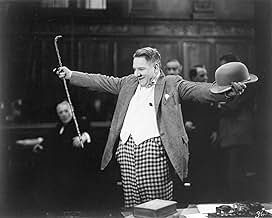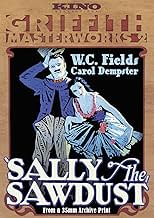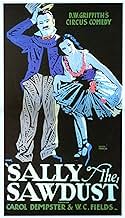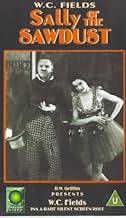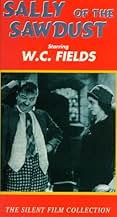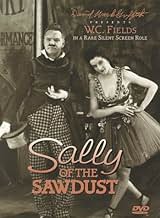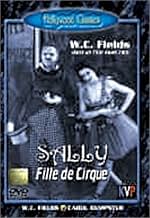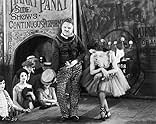Adicionar um enredo no seu idiomaJudge Foster throws his daughter out because she married a circus man. She leaves her baby girl with Prof. McGargle before she dies. Years later Sally is a dancer with whom Peyton, a son of ... Ler tudoJudge Foster throws his daughter out because she married a circus man. She leaves her baby girl with Prof. McGargle before she dies. Years later Sally is a dancer with whom Peyton, a son of Judge Foster's friend, falls in love. When Sally is arrested McGargle proves her real pare... Ler tudoJudge Foster throws his daughter out because she married a circus man. She leaves her baby girl with Prof. McGargle before she dies. Years later Sally is a dancer with whom Peyton, a son of Judge Foster's friend, falls in love. When Sally is arrested McGargle proves her real parentage.
- Direção
- Roteiristas
- Artistas
- Prêmios
- 3 vitórias no total
- Leon - the Acrobat
- (as Glen Anders)
- Stooge
- (não creditado)
- Bandit
- (não creditado)
- Bit Role
- (não creditado)
- Yokel in the Old Army Game
- (não creditado)
- Direção
- Roteiristas
- Elenco e equipe completos
- Produção, bilheteria e muito mais no IMDbPro
Avaliações em destaque
Carol Dempster is quite mixed. I tend to find her unremarkable in most of her work and she only tended to shine in less glamorous/winsome roles (see ISN'T LIFE WONDERFUL for a genuinely great performance from her). Here, she veers between outright badness and inspired in what might be the most uneven performance of her short career. It often does not feel like she's playing a character so much as employing several facial tics repetitively in front of the camera: she winks, she coos, she does little dancing motions. It's supposed to come off as peppy but it often grates. Her emotional scenes are disastrous, complete with shameless mugging. However, Dempster excels in the physical scenes, like when she escapes a courthouse through a high window or when she's interacting with an elephant. I maintain that Dempster was best at playing active, everyday characters and not the Victorian girl-women Griffith liked to populate his movies with.
SALLY OF THE SAWDUST was one of Griffith's last films and is quite unlike anything else in his filmography. It's definitely worth seeing, though if you've never seen a silent movie before, I would not make this one your first.
Before Sally is born her well bred and off mother decides to run off with a show person against parents wishes and is disowned. With the father dead and the mother dying Poppy (Fields) agrees to return the child to her parents but then he decides to raise her himself. Together they tour and perform into her adulthood when the day of reckoning approaches, further complicated by Sally's romance with a swell and member of her grandparents polite society who disdain show people.
Directed by D.W. Griffith in the latter half of his career, Sally has a dated look for a 25 silent with many scenes hearkening back to his halcyon period a decade earlier as his famous montage style looks more like a Mack Sennett Keystone short in spots. Once again he focuses on societal hypocrisy and intolerance but it comes across hackneyed. Silent film had moved into its golden era and Griffith remained inert while Vidor, DeMille and Ingram were taking form and content to another level.
Fields is both funny and touching as he protects Sally and tries to make a living in a variety of dubious enterprises. Dempster is remarkably agile as she takes her licks in more than one scene as well as have a chameleon like look that goes from homely tomboy to deco sleek vamp. It is the energy and talent of both that carry Sally as they leave D.W. anachronistic style in the dust.
This is a very good film with a few laughs here and there and a sort of odd editing style (I don't know how to describe this other than it shows long shots, then sort of jumps back a few seconds or changes angle suddenly as a close up is shown). Carol Dempster, who plays Sally, is delightful here - quite cute and comical in her performance. W.C. Fields, even without his famous voice, is very funny - just the way he moves and his amusing, comical reactions to things (like a small dog seen in one funny scene), we even see him juggling briefly in this. I love the few peeks at the old-fashioned circus and carnival that is shown here. The print of this featured on the DVD is very nice looking, tinted a light sepia tone, and the piano score for this is really excellent, performed by Philip Carli based on the original cue sheets.
Later remade as Poppy (the original title) with Fields in the same role.
This is not, of course, D. W. Griffith's masterpiece, but it does showcase his film-making savvy in full maturity. He uses all his innovations, which are techniques we take for granted now: close- ups, cross-cutting, a mobile camera, and the ability to modify acting from theatrical exaggeration to cinematic subtlety.
W. C. Fields also showcases his skills-- not his signature gruff delivery, but his remarkable dexterity as a physical comedian. He does a few inventive juggling acts, cut too short to be fully appreciated, and some very deft pickpocketing, but it seems that every prop that comes within reach gets manipulated for comic effect-- hat, cane, car roof, dog, cash. He's a joy to behold.
Much has been said against Carol Dempster as an actress, but not by me. She was 22 at the time, playing a teenager, and her combination of grace and awkwardness is engaging, particularly when she dances. She's not a beauty-- though she's positively luminous in the scene where she's gussied up like a Talmadge sister-- but her plainness enhances her simple affection for Fields, her guardian.
Finally, there is Alfred Lunt in one of his rare film roles, as a dashing leading man. He and his British wife Lynne Fontane (a lavender marriage) made one talkie together-- a wonderfully funny one, "The Guardsman," in 1931-- after which they quit movies forever for the Broadway stage, where they reigned from 1923 to 1957. So famous and powerful were they that they would only accept theatrical contracts which allowed them to work together. As for movies, Fontanne wrote to the Hollywood producer who tried to lure them back with huge flippin' wadges of cash, "We can be bought, but we cannot be bored."
Você sabia?
- CuriosidadesD.W. Griffith had good reason not to use the name or title "Poppy" for this movie -a movie titled "Poppy" with a character by that name had come out in 1917.
- Erros de gravaçãoWhen Sally and Eustache were lying on the railway, after get wet on the train, you can clearly see that the railway ends on the film studio wall, right behind them.
- ConexõesFeatured in W.C. Fields: Straight Up (1986)
Principais escolhas
Detalhes
Bilheteria
- Faturamento bruto nos EUA e Canadá
- US$ 304.081
- Tempo de duração1 hora 44 minutos
- Mixagem de som
- Proporção
- 1.33 : 1
Contribua para esta página


